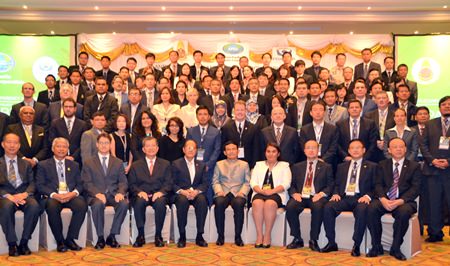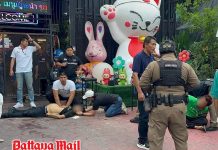About 150 government and law-enforcement officials from Asian-Pacific countries continued work on a regional framework to weed out corruption and curb money laundering at a forum in Pattaya.
Justice Minister Gen. Paiboon Koomchaya opened the Sept. 22-24 Asia-Pacific Economic Cooperation Multi-Year Project at the Dusit Thani Hotel with National Anti-Corruption Commission members, Chilean Attorney-General’s Office representative Solange Huerta and Chonburi local politicians.
 About 150 government and law-enforcement officials from Asian-Pacific countries met in Pattaya to continue work to weed out corruption and curb money laundering.
About 150 government and law-enforcement officials from Asian-Pacific countries met in Pattaya to continue work to weed out corruption and curb money laundering.
The APEC Multi-Year Project began last year with a meeting in Chile to draft a handbook that provides information on how to investigate and prosecute graft and money laundering. The manual will be a key document for countries that lack a systematic approach to investigating corruption and money laundering, especially when it comes to following the money trail.
The book will focus on effective techniques to backtrack money and intelligent investigation, which can be used as evidence to improve the system to prevent corruption through APEC’s Anti-Corruption-Focused Financial Intelligence Unit. A third meeting in the Philippines is planned for next year.
Talks began in Chile in April 2013, focused on investigation and prosecution. This month’s session in Thailand reviewed work done since April and added new measures on backtracking.
Attending the session were government authorities and police from APEC nations and those outside the region, including U.S. Federal Bureau of Investigation and International Center for Asset Recovery of the Basel Institute on Governance in Switzerland.
The meeting was divided into two sessions: theoretical lectures by experts and representatives from the APEC economic zone on the methods and techniques including the ways to track, seizing and sequestration of assets in APEC and dividends for training group.
It also covered financial screening technology for asset recovery workshops on designing models to prosecute corruption and money laundering, and investigate intelligence for effective conviction and asset recovery.
Paiboon said that junta leader and now Prime Minister Prayuth Chan-ocha has made the elimination of corruption a national priority and has focused on improving corporate governance.
The country, he said, is part of the United Nation’s Convention Against Corruption and he said that, as justice minister, he is ready to push for changes in laws to increase transparency.
NACC Commissioner Pakdee Pothisiri said the Multi-Year Project is useful for moving the nation’s strategies forward to the second phase, especially, as it relates to the development of cooperation.
Thailand, as the host country for the APEC talks, has to make its citizens aware of the increasing rate of corruption to support the organization’s objective, which if met will create a stronger regional force against corruption, he said.




